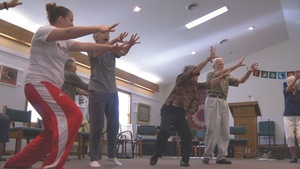

A scene from one of Rachel Denham's dance classes.
A friendly connection between Emory, Va., and Brooklyn, N.Y., resulted in a dance class for people with Parkinson's disease.
Rachel Denham and April Grace lead the classes at the Unitarian Church near Meadowview, Va. Classes are held Thursdays at 10 a.m., and are free.
"A friend of ours, now deceased, had a daughter who is a physical therapist for the Merce Cunningham dance group and for other dancers. She has a studio/office in the Mark Morris Dance group building in Brooklyn," Denham says. "Our friend learned of their program called Dance for Parkinson's at danceforpd.org. She was concerned that several friends here in the Emory area suffered from Parkinson's and wanted to do something for them, so she paid our tuition (Denham's and Jennifer Wagner's) to take the training in Brooklyn to become teachers. Since then we have attended several other training sessions and enlisted two more teachers."
Denham's original co-teacher, Jennifer Wagner, now helps when she's needed and attends the class with her husband. Tomi Short, a ballet teacher, helps with the class every third Thursday.
The class begins with seated warm-up dance movements. "Then we stand behind our chairs; if we were in a dance studio we would go to the barre. Then we move across the floor and finally end with a circle dance or something similar," Denham says. "All of the class focuses on dance, not therapy or exercise. We are in a dance class."
Dancers say that they move better, and their spirits are lifted. "They are dancing, not thinking about what they cannot do, but how much they can do," Denham says.
"I find the teaching very rewarding and enjoy doing it," Denham says.
Dance for Parkinson's has classes in more than 100 communities in nine countries. According to the organization's website, Dance for Parkinson's teaching artists integrate movement from modern and theater dance, ballet, folk dance, tap, improvisation and choreographic repertory. The class is an aesthetic experience that uses the elements of narrative, imagery, music and community to develop artistry and grace while addressing specific concerns such as balance, flexibility, coordination, isolation and depression.
The classes engage the participants' minds and bodies and create an enjoyable, social environment that emphasizes dancing rather than therapy. Active demonstration by professional dancers inspires participants to recapture grace, while guided improvisation fosters creativity and experimentation with movement.
If you would like more information about joining the class, you can simply attend a class or call 276-944-5363.
THERE'S MORE
>> Dancing helps children with confidence and poise